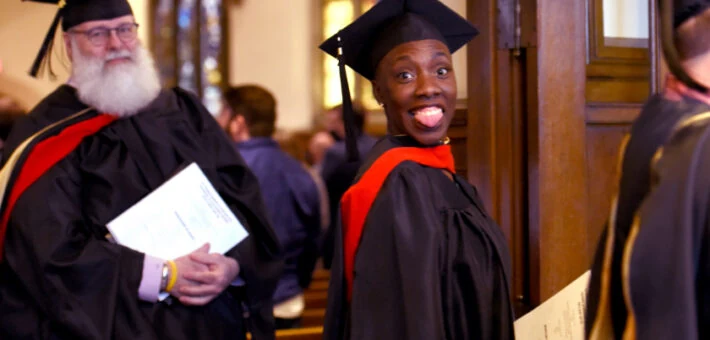Master Of Arts in Leadership
Prepare to Lead From a Place of Faith
Develop the theological and practical skills you need to be an ethical and effective leader in a nonprofit, philanthropic, community, or ministry environment.
The Master of Arts in Leadership degree from United is ideal for those who wish to lead in non-faith vocational paths or from a faith-based perspective, enabling you to engage current issues and ideas with methodologies required in an increasingly pluralistic and complex world.
MAL Program Details
Required Credits
To graduate with a MAL degree, you will be required to complete a total of 48 credits. This typically involves the completion of sixteen 3-credit courses, including one field experience (e.g. internship, practicum).
Time to Complete
This 48-credit program can be completed in approximately 2 years if you maintain a full-time course load (9 credits per trimester).
Thesis
The MAL culminates in a capstone final project that applies your learning from the program to a chosen aspect of your planned vocation.
Distance Learning
All MAL concentrations can be completed entirely via distance learning. All courses have the option to attend classes either in person or via Zoom, and many courses can be taken completely asynchronously with no required class meetings.
A graduate of United’s Master of Arts in Leadership degree program will be able to:
- interpret a selected passage from a selected religious text from multiple historical and contemporary perspectives and using one or more critical methods, demonstrating understanding of the influence of their own situatedness on that interpretation;
- critically interpret, analyze and reflect on a selected theological text or perspective in its historical context as well as through the lens of modern questions and challenges;
- apply to their vocational context or academic study an appropriate critical analysis of and reflection on a selected moral dilemma from a variety of Christian OR interreligious ethical perspectives;
- critically analyze and reflect on the religious history and theological perspectives of a selected population historically marginalized by the dominant voices of their religious traditions;
- evaluate one’s spiritual development in light of one’s own “sources of the self” and religious horizons;
- identify, transform, and/or create specific sources of spiritual power that resist human degradation and enhance human life;
- critically analyze and reflect on the global expressions of religions in relation to their own faith tradition;
- articulate an informed understanding of the historical use of the arts as a means of theological or religious expression and reflection OR an informed understanding of the complex relationships among art, culture and religion;
- analyze a historical or contemporary artistic or cultural work for the ways it expresses spiritual and religious ideas;
- interpret cultural and vocational contexts and identify strategic points of leadership for social transformation;
- develop an effective plan for a social transformation initiative that includes a needs assessment, strategies and plans that address those needs, a communications plan, and a plan for acquiring needed resources;
- add to the body of knowledge and practice in a chosen specialized vocational setting through the thoughtful synthesis of knowledge and skills in religious texts, theology, ethics, formation, contextualization, the arts, social transformation, and/or vocational practice; and
- demonstrate effective academic theological research and writing skills.
Master of Arts in Leadership Concentrations
United’s MAL degree offers the following areas of concentration:
Social Transformation
Faith Formation
Spiritual Direction
Humanist Studies
Specialized Ministry
Want to Learn More?
Fill out the form below and a member of our Admissions team will be in touch soon.
